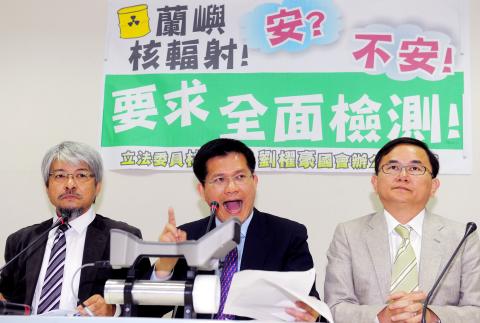Democratic Progressive Party (DPP) lawmakers and several academics yesterday told a press conference that the nuclear radiation level in Lanyu (蘭嶼), also known as Orchid Island, was a serious concern and demanded a complete investigation into potential radiation threats on the island.
Katsumi Nakao of J.F. Oberlin University and Yoh Kato of Tokyo Metropolitan University, who were invited by the Atomic Energy Council to conduct radioactivity tests on the island on Nov. 10 and Nov. 11, decried the detection results announced by the council, saying the real levels were significantly higher than those reported by the council.
The council yesterday reaffirmed the safety of the island, where a nuclear waste storage facility is located, after joint readings by Nakao, Kato and five Taiwanese professors.

Photo: CNA
It said the tests done by different units all showed that readings of radiation levels were within the variation of environmental background radiation, so tourists should not be worried about visiting the island.
The council said it had invited the Council of Indigenous Peoples, the Taitung County government, local representatives and environmentalists to the island to check radiation levels between Sept. 11 and Sept. 17, and also invited specialists from Taiwan and Japan along with specialists from the council’s Radiation Monitoring Center to test the environment radiation levels on Nov. 10 and Nov. 11.
It said that while Japanese specialists discovered abnormal levels of radiation around a cement wall in Langtao Village’s (朗島) former health center, the tests done by specialists from three Taiwanese units showed that radiation levels were within safety limits.
After analyzing the radiation testing devices used by the Japanese specialists on Friday, the council said it discovered that the devices might have been affected by electromagnetic waves from mobile phone base stations, so the readings did not effectively measure non-ionizing radiation leaked from nuclear waste on the island.
Both Kato and Nakao said the radiation level at Langtao Village detected by their equipment was “unusually high,” while the council said no abnormal data had been detected.
The Japanese professors later donated their detection equipment to Lanyu residents.
Taipei Medical University professor Chang Wu-shou (張武修), who was on the research team, said the council’s detection equipment was of questionable reliability.
DPP legislators Lin Chia-lung (林佳龍), Liu Chao-hao (劉櫂豪), Gao Jyh-peng (高志鵬) and Ho Shin-chun (何欣純) accused the council of lying to Lanyu residents.
In addition, Lin said that the council had lost its credibility.
“That was why they [Lanyu residents] would rather trust the Japanese professors than the government agencies,” Lin said.
Thirty years after the storage facility was built without prior consultation and communication with Lanyu residents, the government has yet to conduct a complete investigation of nuclear radiation on the island, Lin said.
With the council’s credibility in question, Liu Chao-hao said an independent institution or research team should be brought in to conduct a thorough inspection of radiation levels on the island.
The council was accused of malpractice concerning nuclear waste repackaging in Lanyu last month.

ANOTHER EMERGES: The CWA yesterday said this year’s fourth storm of the typhoon season had formed in the South China Sea, but was not expected to affect Taiwan Tropical Storm Gaemi has intensified slightly as it heads toward Taiwan, where it is expected to affect the country in the coming days, the Central Weather Administration (CWA) said yesterday. As of 8am yesterday, the 120km-radius storm was 800km southeast of Oluanpi (鵝鑾鼻), Taiwan’s southernmost tip, moving at 9kph northwest, the agency said. A sea warning for Gaemi could be issued tonight at the earliest, it said, adding that the storm is projected to be closest to Taiwan on Wednesday or Thursday. Gaemi’s potential effect on Taiwan remains unclear, as that would depend on its direction, radius and intensity, forecasters said. Former Weather Forecast

As COVID-19 cases in Japan have been increasing for 10 consecutive weeks, people should get vaccinated before visiting the nation, the Centers for Disease Control (CDC) said. The centers reported 773 hospitalizations and 124 deaths related to COVID-19 in Taiwan last week. CDC Epidemic Intelligence Center Director Guo Hung-wei (郭宏偉) on Tuesday said the number of weekly COVID-19 cases reported in Japan has been increasing since mid-May and surpassed 55,000 cases from July 8 to July 14. The average number of COVID-19 patients at Japan’s healthcare facilities that week was also 1.39 times that of the week before and KP.3 is the dominant

The Chinese Communist Party’s (CCP) working group for Taiwan-related policies is likely to be upgraded to a committee-level body, a report commissioned by the Mainland Affairs Council (MAC) said. As Chinese President Xi Jinping (習近平) is increasingly likely to upgrade the CCP’s Central Leading Group for Taiwan Affairs, Taiwanese authorities should prepare by researching Xi and the CCP, the report said. At the third plenary session of the 20th Central Committee of the CCP, which ended on Thursday last week, the party set a target of 2029 for the completion of some tasks, meaning that Xi is likely preparing to

US-CHINA TRADE DISPUTE: Despite Beijing’s offer of preferential treatment, the lure of China has dimmed as Taiwanese and international investors move out Japan and the US have become the favored destinations for Taiwanese graduates as China’s attraction has waned over the years, the Ministry of Labor said. According to the ministry’s latest income and employment advisory published this month, 3,215 Taiwanese university graduates from the class of 2020 went to Japan, surpassing for the first time the 2,881 graduates who went to China. A total of 2,300 graduates from the class of 2021 went to the US, compared with the 2,262 who went to China, the document showed. The trend continued for the class of 2023, of whom 1,460 went to Japan, 1,334 went to